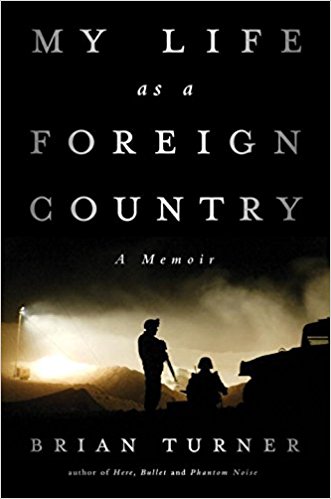
It’s weird, but for a guy who read nothing but chronological nonfiction for decades, you’d think my writing style would be more linear. It’s as if all that reading was mere foundation, but what I exposed myself to during my MFA has turned into the real reading that has whittled my writing style into some kind of form.
I was pretty happy when the news of this book hit the wire, especially after having read Turner’s book of poetry, Here, Bullet. And not because I enjoyed Here, Bullet so much (I did) as much as the advanced reviews were already talking about the radical fragmentation of My Life. Imagine me: looking for fragmented narratives and finding not just a fragmented memoir, but one written by a fellow veteran.
[insert sound of blown mind]
The book began as an essay of the same name for Virginia Quarterly Review (I know that thanks to an awesome Dinty Moore interview with Turner on the Brevity blog.) If you haven’t read the book, but want to take it for a spin first, read the essay. It’ll have you running for the “buy this book” link below.
The idea of breaking apart a narrative in memoir is a relatively recent phenomenon, especially in war memoir. Only Herr’s Dispatches fits the mold; the riskiest form anyone else reaches would be memoir-in-essay (Wolff, and he didn’t do it until the 90s.) The Forever War has produced far more traditional memoir structures than it has open forms. So, it’s hard to overstate the importance of an example of something you’re trying to do, by a writer who kind of looks like you, related to an experience you both share to a certain degree. Which isn’t to say that I want to write books that look just like Busch’s, Castner’s, or Turner’s. I don’t, but it’s also helpful to see what works/what doesn’t.
There’s not much of the latter in My Life as a Foreign Country. Perhaps the most postmodern of war memoirs to date, it has, as Charlie Sherpa put it in his review of the book, enough poetry, fiction, and nonfiction within its pages to satisfy a reader of any genre. And it’s that pastiche of genre that I took to be the most important craft takeaway.
I put the technique to work in an essay that I was working on when I read My Life as a Foreign Country. It’s probably not writer-cool to say, but fully half or more of my essay “Calling Jody with the Ghost Brigade” for The Normal School was inspired by Turner’s example of allowing room for imagination within a nonfiction narrative. It’s certainly not for everyone, as evidenced by the twenty-odd rejections I received before The Normal School accepted the essay. But I was happy to get it out into the world, and I think it’s a fine example of being inspired by a technique enough to try it out, and experiencing some success with it.
I have Big Opinions on the unacknowledged link between postmodernism and contemporary memoir that I hope to publish somewhere tweedy in the months to come, but that’s for another today. Today, it’s enough to say that My Life as a Foreign Country is a great book, and genre-challenging example for any writer looking to push the form. Oh, and you should totally buy the book.
Brian Turner is awesome!
LikeLike
I know, it’s heartbreaking. I keep thinking about that first AWP Panel, where he stole the show.
LikeLiked by 2 people
Hi Matt, great post, and I share your admiration for My Life and for Charlie Sherpa’s perceptive review. The subject of whether our unfocused, surreal, and never-conclusive modern wars, such as Vietnam and Iraq/Afghanistan, demand postmodernist (or modernist, since so many of the techniques were in play by the time of Joyce) literary tactics is an interesting one. But another way to look at it is that memoirs such as Turner’s reflect a multi-voiced, polyvocal cacophony of voices that is very traditionally American both in literary and cultural terms, democratic and expansive in ethos rather than exotic, esoteric, closed-off and weird, and maybe more backward looking at history than forward looking to the future. Tough stuff to figure out, for sure, but you’re the man to do it!
LikeLike